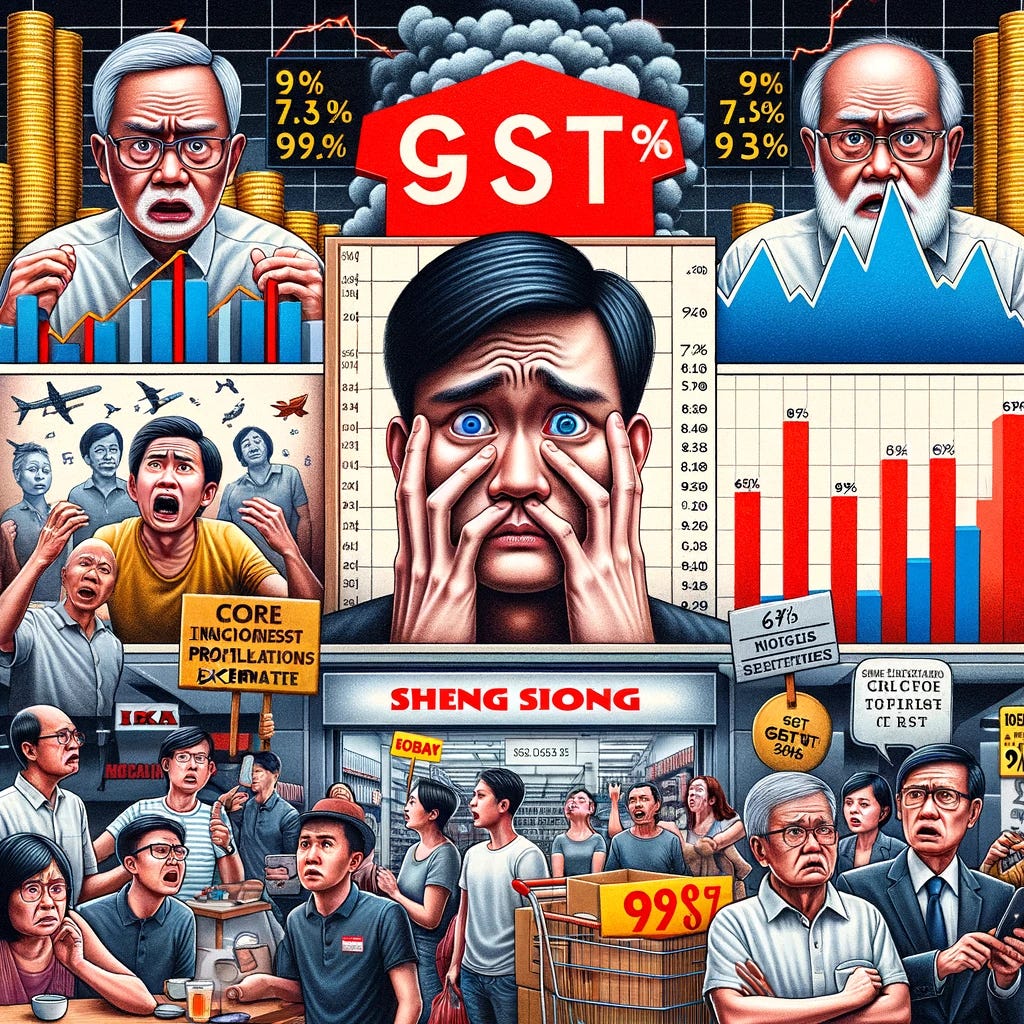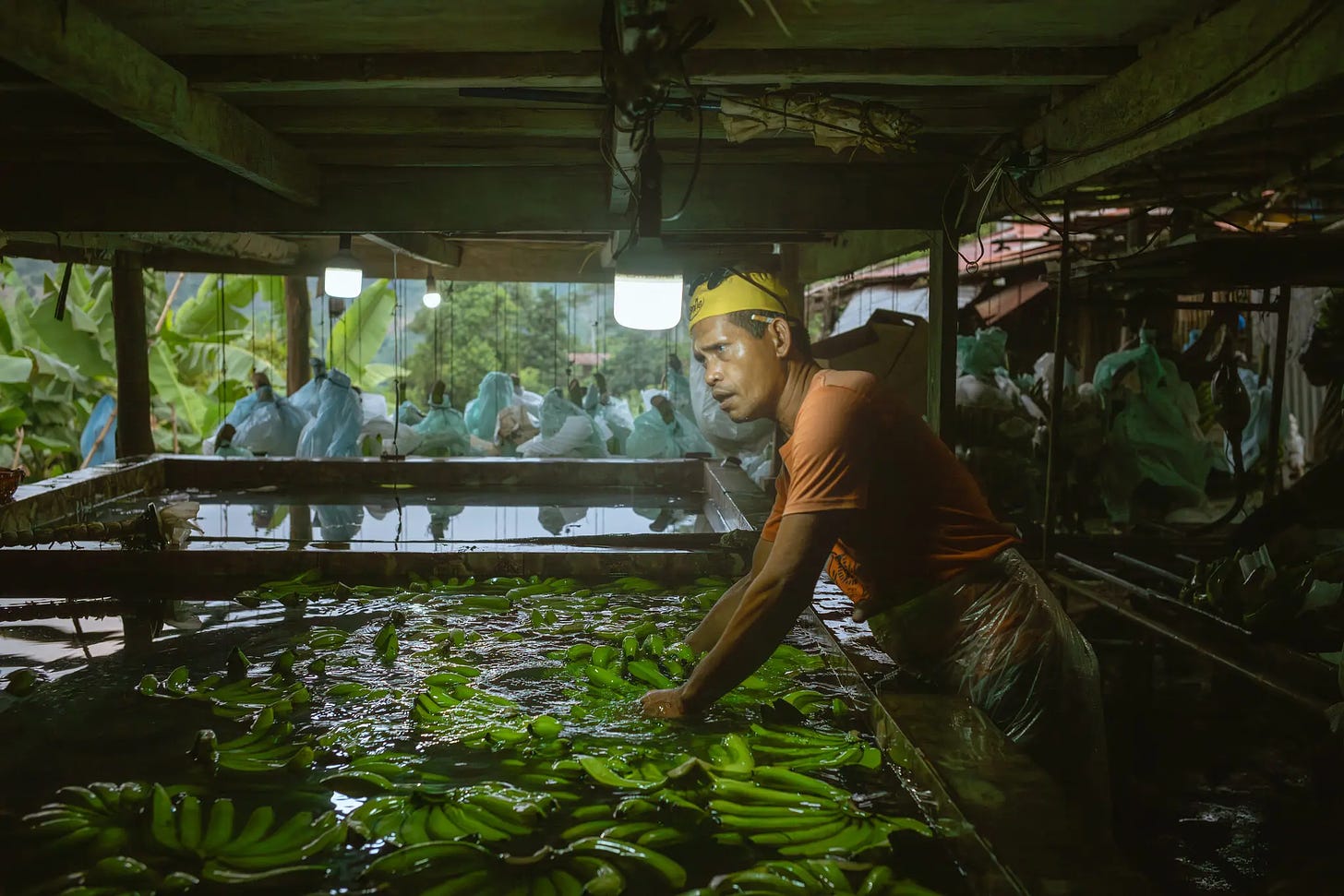Southeast Asia & World Briefs (9 Jan): Israel’s new approach to Gaza; Tax hike in Singapore/Malaysia; Colonial past still haunts Philippines
Happy New Year and Welcome to 2024!
Hopefully, you had a satisfying break. Our side took two weeks off from the newsletter. Let’s get back right to several key developments, which are a lot, especially from country-specific stories (geopolitics will start happening more as we move away from the New Year)
For this edition, we’ll start with the new strategy the Israeli military is implementing with the Gaza invasion. Next is the tax-increasing policies from Singapore’s GST hike and Malaysia’s LVG tax as both governments try to lock down more revenue for them (and the people, of course). Lastly, we’ll go through social stories like the Philippines’ ongoing struggle with the agricultural economy due to its colonial past and more…
Let’s get right into it
Tables of Contents and Summaries
Geopolitics
🌍 Israeli Military Enters New Phase in Gaza Invasion with Reduced Intensity
Israel's military operation in Gaza shifts to a less intense phase, scaling back ground troops and airstrikes under international pressure.
Gazan health officials report ongoing civilian casualties despite the Israeli military's focus on targeted operations against Hamas.
Social/Economics
🇸🇬 Singaporeans Bracing for Psychological Impact of GST Hike Amid Political Debate
Singaporeans grapple with the psychological effects of a GST increase, amidst political debates and economic concerns.
The GST hike, part of the upcoming general elections debate, has spurred retailers and small businesses to adapt, with government measures anticipated.
🇲🇾 Malaysian Outrage Over Online Tax on Cheap Goods
New 10% Tax on Online Imports: Malaysia imposes a 10% LVG tax on imported items worth up to 500 ringgit, causing public upset.
Impact on Consumers and E-commerce: The tax, aimed at supporting local businesses, leads to higher online prices; experts question its effectiveness.
🏳️🌈 LGBTQ Couples in Singapore Face Legal and Social Barriers Despite Legal Progress; Limited Access to Childcare, Parents Rights, and Housing
LGBTQ couples in Singapore confront legal and social challenges, including limited access to childcare and housing, despite the repeal of anti-LGBTQ laws.
The legal and societal hurdles reflect ongoing tensions and debates over LGBTQ rights and societal norms in Singapore.
🇵🇭 Philippines’ Colonial Legacy Continues to Haunt its Economic Growth
The Philippines' economic structure, shaped by its colonial past, heavily favors agriculture, impacting growth and contributing to poverty.
The country's focus on agriculture, controlled by powerful families, contrasts with other Asian countries' industrial development, limiting job opportunities.
💻 Philippines as the Top 30 Most-Cyberattacked Countries; National Cyber Team Has Only 35 Members
The Philippines, among the top 30 most-cyberattacked countries, struggles with cybersecurity challenges due to an understaffed national team.
Facing significant threats, especially from China, the country's limited cyber defense capabilities underscore a growing global concern over cybersecurity.
✈️ Thailand-China Visa Waiver Boosts Tourism; Free Visa Both Ways
Thailand and China's mutual visa waiver aims to boost tourism, crucial for Thailand's economy, but concerns remain over Chinese tourist spending amidst economic slowdown.
The move comes as Thailand seeks to revive its tourism industry, still recovering from the pandemic, with new policies and airline expansions.
Geopolitics
Israeli Military Enters New Phase in Gaza Invasion with Reduced Intensity
Rear Adm. Daniel Hagari announced a transition in Israel's Gaza campaign, reducing ground troops and airstrikes.
This change follows pressure from the U.S. and allies, amidst concerns over civilian casualties and widespread destruction.
Despite the shift, Gazan health officials report ongoing civilian deaths, with Israeli forces surrounding hospitals accused of harboring Hamas military infrastructure.
Strategic Refocusing: Israel aims to concentrate on targeted operations in Hamas strongholds, particularly in southern and central Gaza, moving away from large-scale maneuvers.
Plans to increase aid and housing for displaced Gazans are underway, as nearly 85% of the population has been affected by the conflict.
Admiral Hagari refutes genocide claims against Israel, emphasizing efforts to avoid civilian casualties and accusing Hamas of using civilian areas for military purposes.
The Israeli official highlights the start of the conflict on October 7, triggered by a Hamas-led raid, as the basis for Israel's military response.
Social/Economics
Singaporeans Bracing for Psychological Impact of GST Hike Amid Political Debate

Despite retail promotions, Singaporeans face the psychological burden of increased expenses due to the GST hike from 7% to 9% between 2023 (increased to 8%) and 2024.
The GST increase is a contentious issue in the upcoming general elections, with rival parties debating alternatives.
Singapore's recent budget focuses on protecting various social groups from inflation and the GST impact.
Inflation Dynamics: Core inflation in Singapore is on a downward trend, but the hike in GST is expected to offset this decline for consumers.
Despite mitigating factors like wage growth, higher daily expenses due to the GST hike remain a concern.
Retailers like Ikea Singapore and Sheng Siong offer discounts and absorb the GST increase to ease consumer burden.
Business Impact: Small businesses, especially with narrow profit margins, are significantly affected by the GST increase.
Singaporeans anticipate further government measures to alleviate the GST impact.
Opposition Stance: The Workers’ Party opposes the GST hike, suggesting adjustments to Singapore’s reserves framework.
Public Acceptance and Upcoming Political Transition: Despite opposition, there is a general acceptance of tax increases, seen as necessary for addressing demographic challenges.
The upcoming budget and political transition are crucial in shaping the government's approach to the GST issue ahead of the 2025 elections.
Prime Minister Lee Hsien Loong plans to hand over leadership to Lawrence Wong before the next general election.
Malaysian Outrage Over Online Tax on Cheap Goods
Malaysia implements a 10% Low Value Goods (LVG) tax on imported items sold online, worth up to 500 ringgit, sparking public backlash.
The tax, effective from January 1, targets online purchases including cosmetics and household items.
Malaysians express frustration over the LVG tax, seeing it as an added financial burden amidst high living costs and a pending sales tax increase.
Government's Stance: The tax aims to support local businesses against cheaper online imports, expecting to generate 200 million ringgit annually.
Initially scheduled for April 2023, it was postponed to January 2024 following public and trader objections.
Malaysia's e-commerce valued at 239.1 billion ringgit in 2022; however, retail e-commerce, directly impacted by LVG tax, contributes just 2 billion ringgit.
Experts debate the tax's efficacy, suggesting it might not justify the price increases for consumers.
Market Reaction and Fiscal Goals: The tax leads to price hikes on e-commerce platforms, but markets may stabilize over time.
The government seeks additional revenue to narrow its budget deficit, with the SST hike expected to raise an additional 3 billion ringgit annually.
LGBTQ Couples in Singapore Face Legal and Social Barriers Despite Legal Progress; Limited Access to Childcare, Parents’ Rights, and Housing
A year after decriminalizing homosexual sex, Singapore maintains a traditional definition of marriage, impacting LGBTQ rights in areas like housing, parenthood, and marriage.
Cally Chia, a Singaporean woman in a same-sex marriage, spent nearly S$30,000 in Australia for fertility treatments, which are not available to single, unwed women in Singapore.
Despite legally marrying in Melbourne, Chia is still considered unmarried in Singapore, disqualifying her from numerous family benefits.
Chia's journey to motherhood illustrates the significant financial and legal obstacles faced by LGBTQ couples in Singapore.
Legal and Inheritance Concerns for LGBTQ Families: LGBTQ couples like Chia face legal uncertainties regarding guardianship and inheritance for their children.
Singapore's housing policies, favouring heterosexual couples, pose significant challenges for LGBTQ couples in securing affordable housing.
Controversies Reflecting Societal Divisions: Recent events, including debates over a drag performance and gender-neutral toilets, highlight ongoing societal tensions surrounding LGBTQ issues in Singapore.
A study reveals persistent discrimination against LGBTQ people in Singapore, with significant concerns over family and housing rights.
Pink Dot (a non-profit LGBTQ+ group) spokesperson notes rising social acceptance but also stronger opposition from conservative groups.
Sociologist Tan Ern Ser argues that repealing Section 377A (a Singapore law that criminalized sex between two consenting males) has had little effect on entrenched heteronormative norms and policies.
Philippines’ Colonial Legacy Continues to Haunt its Economic Growth
Spanish and American colonial policies shaped the Philippines' current economic structure, favouring agriculture over industrial development.
The Philippines' heavy reliance on agriculture, a colonial legacy, contrasts with other Asian countries' industrial growth.
Wealthy families retain control over land and politics, a remnant of U.S. colonial policy avoiding large-scale land redistribution.
Manufacturing Deficit: With manufacturing at only 17% of the economy, Filipinos face limited job opportunities compared to other Asian nations.
Poverty and Hunger: The skewed land distribution and lack of industrial jobs contribute to widespread poverty and hunger.
Some earn just 380 pesos ($6.80) a day, insufficient to cover basic necessities.
Many Filipinos work abroad, sending remittances home due to a lack of local opportunities.
Indigenous tribes like the Manobo struggle against powerful families for land rights, exemplified by conflicts with Lapanday Foods.
Philippines as the Top 30 Most-Cyberattacked Countries; National Cyber Team Has Only 35 Members
The Philippines faces a severe challenge from cyberattacks, a more significant threat than maritime disputes in the South China Sea.
The national cyber response team, with only 35 members, struggles with underfunding and understaffing, hindering effective cybersecurity measures.
The team's scarcity of resources leads to collaborations with "black hat" hackers for intelligence on potential threats.
International Concerns Over China's Digital Threats: Global governments, including the US and UK, have expressed apprehensions about China's expanding cyber espionage activities.
China Denies Allegations: In response to accusations, China maintains its stance as a victim of hacking and opposes what it terms "baseless rumors and slanders."
Stately Taurus, a Chinese Group, Suspected: The group allegedly compromised a Philippine government agency with activities aligning with Chinese government interests, as reported by Palo Alto Networks.
Over 60,000 Filipino user accounts were compromised in one quarter, ranking the Philippines among the top 30 most-attacked countries.
Thailand-China Visa Waiver Boosts Tourism; Free Visa Both Ways
Thailand and China mutually eliminate visa requirements, starting March.
Thailand's economy, heavily reliant on tourism, previously allowed visa-free entry for Chinese tourists until February.
Both Thailand and China expressed interest in increasing tourist visits and strengthening cooperation.
In 2023, Thailand attracted 28 million foreign tourists, with the highest number from Malaysia and China, contributing significantly to its economy.
Comparison to Pre-Covid Levels: Tourist numbers are still below the pre-Covid record of 39 million; China was the largest source then.
Chinese Tourist Concerns: The economic slowdown in China raises concerns about reduced tourism spending.
Airline Expansion: Eight new Thai airlines, including Really Cool Airlines, to commence operations amidst expected tourism growth.
Tourism-Friendly Policies: Thailand approves tax cuts on alcohol and entertainment venues, extending nightlife hours to enhance tourist appeal.
If you like our content, please subscribe. As always, feedback is open either via comments, email, or SubStack’s chat. We’re also open for you to request any coverage or deep dive you want us to research (reasonable request please!)








